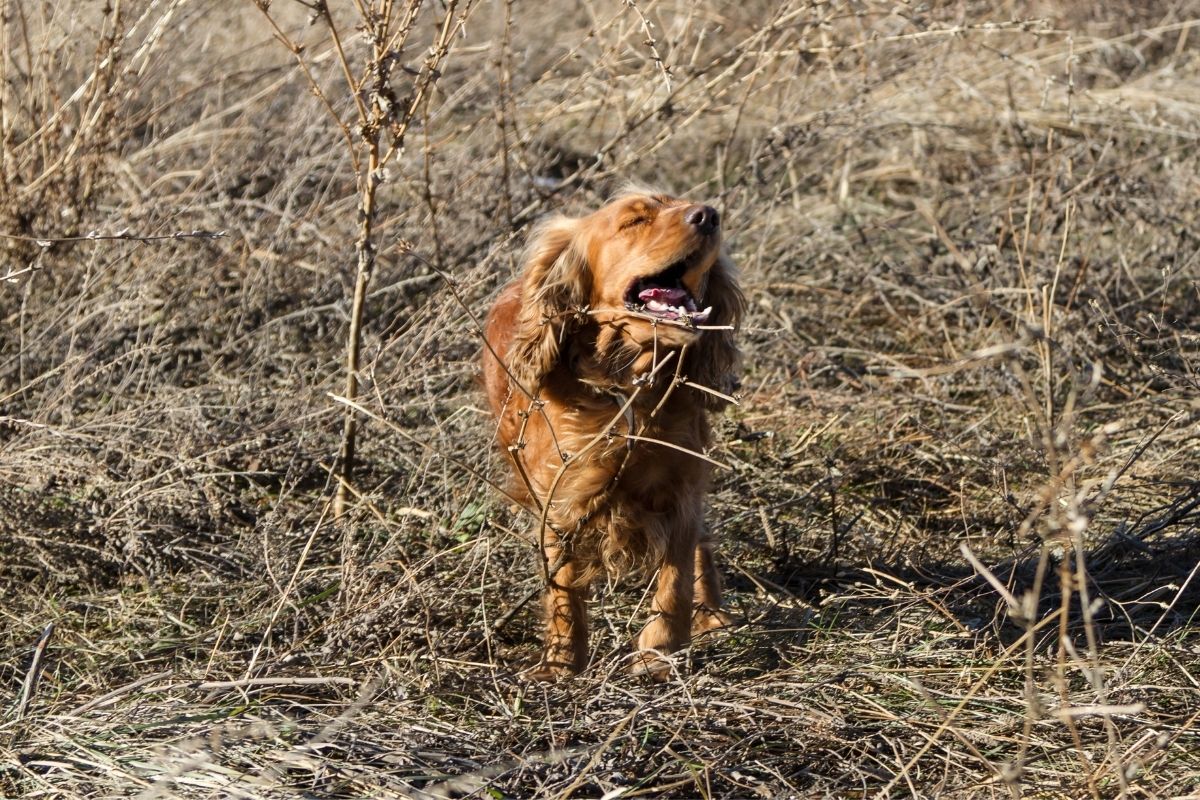The Cocker spaniel is a breed of gundog. It is a good-natured and active sporting dog that is well and compactly built – a choice for most dog lovers.
But why do Cocker Spaniels bark a lot more than most other dog breeds?
Cocker spaniels are considered quite notorious barkers because their bark is a natural response to stimuli or situations. They bark as a warning to specific situations, especially as a natural way to communicate or respond to situations such as perceived danger, the telephone, or doorbell ringing.
What causes Cocker spaniels to bark?
Unlike other dog breeds, numerous triggers can make a Cocker spaniel embark on a barking spree, which you would probably agree can be annoying.
The Cocker spaniel has a heightened level of separation anxiety.
And unlike other breeds, the English Cocker spaniel requires a great deal of companionship.
Otherwise, they will express their unhappiness through endless barking.
That said, let’s focus on the reasons why Cocker spaniels bark a lot, why they bark, and some of the measures you can take to minimize their barking:
Why are Cocker spaniels notorious barkers?
It is natural for all dogs to bark. That is a fact of life.
And whereas some dogs will bark more than others, some breeds are more prone to barking than others.
As already stated, though, a dog barks to communicate. It is their language.
But the Cocker spaniel is one of the most notorious barking breeds of dogs.
They bark naturally to respond to or communicate certain situations that may include but not limited to:
Excitement
Perceived danger
Weird noises
Making demands
Despite their excessive barking, Cocker spaniels are a top-notch lovely and cool-tempered breed of dogs.
They bark to let you know about things.
But to a certain extent, as most of your dog lovers would agree, it can be rather annoying when your dog starts barking literally at everything without any apparent reason.

Common causes of barking in Cocker spaniels
If you own a Cocker spaniel, you will bear me witness that it is one of the most lovable dogs.
And more often than not, you will realize that it will bark under the following circumstances:
Every time you play with it in the garden with toys.
When the doorbell goes, and he is excited to see who the visitor is.
When it bumps into strange or unfriendly dogs while out for a walk in the park.
The above three situations can trigger your Cocker spaniel to bark. And for how long will depend on how good you are when at controlling your dog.
In this case, the first step would be to identify the reason for its barking before you can calm it down.
Other reasons for barking in Cocker spaniels
Cocker spaniels do not have the patience to be left alone for several hours because, unlike most breeds, they need a great deal of companionship.
Most Cocker spaniels would always almost certainly respond by barking when on they are on their own.
In other situations, they may respond by engaging in destructive chewing and growling – a show of emotional sensitivity.
Beyond that, the following causes could trigger your Cocker spaniel to a barking spree (and this isn’t isolated to this breed only).
To seek attention
You can tell that your dog wants attention if, while barking, it rolls on the ground or growls.
All dogs want attention, but Cocker spaniels demand attention and affection from their owners.
If they don’t get it in abundance, they will bark.
They can also bark to make certain demands such as:
Going to the toilet.
Needing to go on a walk in the park.
Wanting a treat.
And whereas you may choose to ignore some of the barking and mistake it for attention-seeking, you will have no choice but give in if it wants to go out..
Territorial barking
This is one of the most common reasons your dog will bark.
Dogs are naturally territorial, and when intruders or other dogs find their way wandering around in a territory they consider theirs, they will bark to scare or give away a warning.
Cocker spaniels, more so, will bark excessively due to their overprotectiveness of family and property.
Furthermore, their barking isn’t always triggered by things out of the ordinary.
Even a delivery man knocking at the door will be perceived as dangerous. And the pattern will be similar; as the danger gets closer, the barking gets even louder.
It gets even worse if the dog hasn’t been consistently or properly socialized.
Loneliness or boredom
A Cocker spaniel has quite a lovely temperament and personality.
They are quite social and energetic, and they don’t respond favourably when left alone for longer periods.
They thrive well with someone or another dog to play with.
If they can’t have the above, then barking will definitely set in.
Besides, because of the frustration that could stem from boredom and loneliness, they can resort to destructive chewing, barking, and growling as an entertainment mechanism.
This happens most if they are either left alone or if they have stayed indoors for long periods.

Separation anxiety
This happens in a similar way to loneliness, as explained above.
If you leave your Cocker spaniel alone for extended periods, it will suffer from separation anxiety.
This condition is detrimental to the dog’s overall mental health, with the immediate response being excessive barking.
That is not isolated to this dog breed either. That’s because, usually, if you leave your dog alone, separation anxiety will set in. And what follows generally is destructive behaviour, of which excessive barking is one of them.
Pain and illness
Pain or illness can also result in a dog that barks to excess.
However, the bark that stems from pain and discomfort is usually low-pitched, unceasing, and usually alludes to a plea for attention to help.
It is vital in such scenarios to check spaniel for any injuries and call in at the vet’s office if necessary.to get him checked at the vet’s if you have any concerns.
Poor socialisation
A poorly socialised Cocker spaniel will always almost certainly bark, and for no apparent reason sometimes.
The best practice is to have your puppy get around humans and other dogs during its early days.
This can be achieved if you do group puppy training. That isn’t easy per se, but it will pay off in the long run.

Compulsive barking
This is the stage you wouldn’t want your dog to get to because it is a nuisance many dog lovers can’t handle.
The barking doesn’t even have to be triggered. What happens is that your dog will bark because she loves to hear its sound of barking.
Hence, it becomes less of a reason why she is barking and more of a behavioural issue.
How do you stop or minimize excessive barking from your Cocker spaniel?
There are a variety of tricks you can use to stop your pup from barking. Some are pretty straightforward, whereas others need consistent training to be successful.
Overall, you will first need to know why your dog is barking before selecting a training technique.
Either way, there are three key tips to bear in mind as you train your dog to stop barking:
Ensure your training sessions are positive and upbeat.
Please do not yell at your dog to be quiet because it would appear or sound like you are merely barking along with them.
Be consistent with your training, not to confuse the dog. You can have family members help administer the training every time your cocker spaniel barks inappropriately.
Ignore the barking
This technique is relatively overlooked, but it can do magic.
If you believe that your Cocker spaniel is barking to have your attention, it is preferable to ignore them for as long as their barking lasts.
While doing so, avoid looking at them, don’t touch them, and do not talk to them as you would be rewarding them for being noisy, which isn’t your goal here.
However, you have to reward them immediately after they stop barking. That is the way to be successful with this technique.
Keep your Cocker spaniel tired.
Ensure that your dog receives sufficient mental and physical exercise consistently.
A tired Cocker is unlikely to bark from boredom, loneliness, or frustration.
To achieve that, you can carry out the following dog routines daily:
A game of chasing and fetching the ball.
Playing with some interactive toys in the garden.
Taking long walks in the park.

Proper socialisation
You can stop your dog from barking unnecessarily by making him get used to different situations, environments, animals, and noises.
This way, he wouldn’t perceive these situations or environments as threats.
Instead, he will learn to associate with them, which will gradually eliminate the barking stimuli.
The ideal stage to properly socialise your dog is when it is still young.
Have your Cocker spaniel fetch something for you
You can easily manage excessive barking by throwing something and then commanding your dog to fetch something for you.
It can be a ball or anything that he can fetch and bring back to you.
However, its downside is that the dog, while still barking, might mistake this as a reward and keep barking even more.
Create a distraction
You can interrupt unnecessary barking from your spaniel by creating distractions.
This can be super helpful, especially if you are dealing with territorial barking. By doing so, you can offer your dog a different kind of stimuli to get his mind off the barking.
KEY CAUSES OF COCKER SPANIEL BARKING AND SOLUTIONS
1. Attention Seeking
- Cause: Cocker Spaniels may bark to get your attention or to initiate play.
- Solution: Reward quiet behaviour and ignore barking. Engage them in activities and provide toys to keep them occupied.
2. Boredom
- Cause: Lack of mental and physical stimulation can lead to excessive barking.
- Solution: Ensure regular exercise and provide puzzle toys. Engage them in training sessions to stimulate their mind.
3. Anxiety or Fear
- Cause: Cocker Spaniels may bark due to anxiety or fear of strangers, other animals, or unfamiliar environments.
- Solution: Identify and gradually expose them to their fears in a controlled manner. Consider consulting a professional dog trainer or a vet for anxiety issues.
4. Territorial Behaviour
- Cause: They may bark to warn or protect their territory from perceived threats.
- Solution: Establish yourself as the pack leader. Use positive reinforcement to reward calm behaviour and gently correct excessive barking.
5. Hunger or Thirst
- Cause: Barking may indicate basic needs like hunger or thirst.
- Solution: Ensure a consistent feeding schedule and always have fresh water available.
6. Pain or Discomfort
- Cause: Barking can be a sign of pain or discomfort.
- Solution: Regular vet check-ups to ensure they are in good health. If barking persists, consult the vet to rule out any health issues.
7. Greeting or Social Barking
- Cause: Barking to greet people or other dogs is common.
- Solution: Train them to greet calmly using commands like “sit” or “stay”. Reward calm behaviour.
8. Separation Anxiety
- Cause: Cocker Spaniels can be prone to separation anxiety, barking when left alone.
- Solution: Gradually accustom them to being alone for short periods, increasing the duration over time. Consider a pet sitter or doggy daycare for longer absences.
9. Breeding Traits
- Cause: Some barking is instinctual and bred into the Cocker Spaniel as a hunting dog.
- Solution: Understand and accept a certain level of barking. Use training to manage and control excessive barking.
10. Lack of Training
- Cause: Without proper training, a dog may not understand when barking is inappropriate.
- Solution: Implement consistent training from a young age, using positive reinforcement techniques.
11. Environmental Sounds
- Cause: Barking in response to other sounds in the environment, such as other dogs barking, doorbells, or cars.
- Solution: Desensitise them to these sounds gradually and reward calm behaviour.
12. Age-Related Issues
- Cause: Older dogs may bark more due to cognitive dysfunction or hearing loss.
- Solution: Provide a safe, comfortable environment and consult a vet for appropriate management strategies.
Note:
Always approach the issue with patience and understanding. If barking persists despite trying various strategies, it may be beneficial to consult a professional dog trainer or a veterinarian to explore further options and ensure there are no underlying health issues.
FAQs
Are certain Cocker Spaniels more prone to barking than others?
There can be individual differences among Cocker Spaniels, and their barking behaviour might vary based on factors such as age, personality, and upbringing. However, the breed as a whole is known to be more vocal compared to some other dog breeds.
How can I train my Cocker Spaniel to bark less?
You can use positive reinforcement training to help your Cocker Spaniel bark less. This involves rewarding your dog for quiet behaviour and teaching them a ‘quiet’ command. It’s also important to address the root cause of the barking, such as boredom or anxiety. Regular exercise and mental stimulation can also help reduce excessive barking.
Are there any other ways to reduce a Cocker Spaniel’s barking?
Yes, in addition to training, providing plenty of physical exercise and mental stimulation can help. If your dog is barking due to separation anxiety, consider seeking help from a professional. It’s also worth noting that some Cocker Spaniels might bark less as they mature and grow out of their puppy phase. If the problem persists, a consultation with a professional dog trainer or a behavioural specialist is recommended.
Final Words
All dogs bark, and it would be unreasonable for anyone to expect them not to. But some dogs and dog breeds bark more than others.
And Cocker spaniels fit seamlessly into this category.
As a Cocker spaniel owner, you should realize that excessive barking is their natural response to situations, environments, people, and other dogs around them.
With patience and the right approach you should be able to reduce the amount of barking that your Cocker spaniel does.




